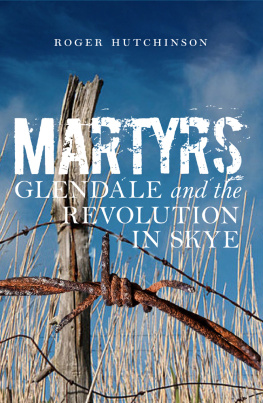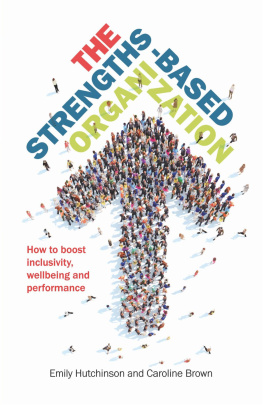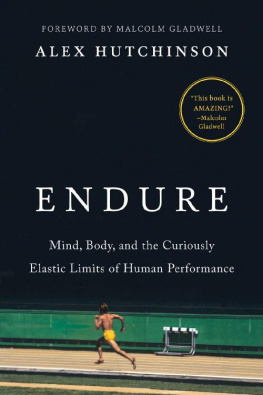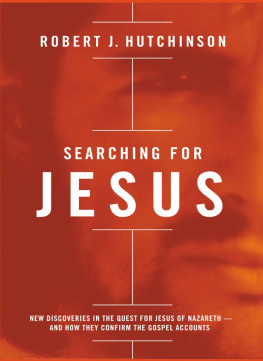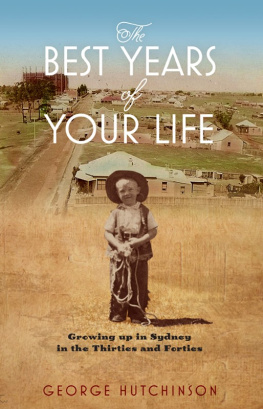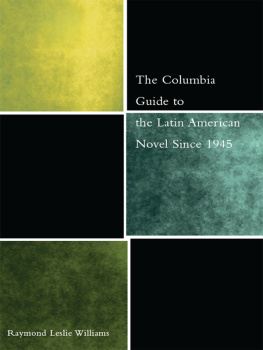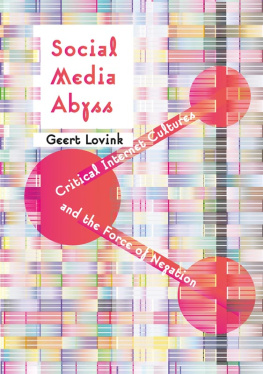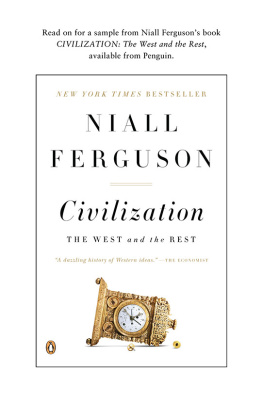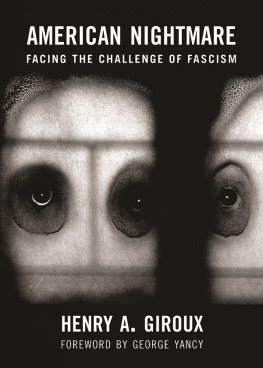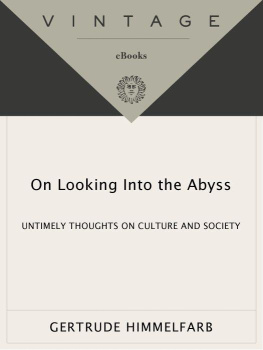FACING THE ABYSS
FACING THE
ABYSS
AMERICAN LITERATURE AND CULTURE IN THE 1940S
GEORGE HUTCHINSON
COLUMBIA UNIVERSITY PRESS
NEW YORK

Columbia University Press
Publishers Since 1893
New York Chichester, West Sussex
cup.columbia.edu
Copyright 2018 Columbia University Press
All rights reserved
E-ISBN 978-0-231-54596-9
Library of Congress Cataloging-in-Publication Data
Names: Hutchinson, George, 1953 author.
Title: Facing the abyss : American literature and culture in the 1940s / George Hutchinson.
Other titles: American literature and culture in the 1940s
Description: New York : Columbia University Press, 2018. | Includes bibliographical references and index.
Identifiers: LCCN 2017025027 (print) | LCCN 2017057804 (ebook) | ISBN 9780231545969 (e-book) | ISBN 9780231163385 (cloth : alk. paper)
Subjects: LCSH: American literature20th centuryHistory and criticism. | Literature and societyUnited StatesHistory20th century. | Popular cultureUnited StatesHistory20th century. | United StatesCivilization20th century.
Classification: LCC PS223 (ebook) | LCC PS223 .H88 2018 (print) | DDC 810.9/0052dc23
LC record available at https://lccn.loc.gov/2017025027
ISBN 978-0-231-16338-5 (cloth: alk. paper)
A Columbia University Press E-book.
CUP would be pleased to hear about your reading experience with this e-book at cup-ebook@columbia.edu.
Cover design: Catherine Casalino
Cover image: H. Armstrong Roberts/ClassicStock/Getty Images
To Jim, Mindy, and Charlie
in memory of Mom and Dad, and Dave

Even in the darkest of times we have the right to expect some illumination, and that such illumination may well come less from theories and concepts than from the uncertain, flickering, and often weak light that some men and women, in their lives and their works, will kindle under almost all circumstances and shed over the time span that was given them on earth.
Hanna Arendt, Men in Dark Times
Not just a specific knowledge, appetite, suffering, and delight of one particular people, not only that, but knowledge of the Whole, greater from having been at the abyss and freeing knowledge of Relation within the Whole.
douard Glissant, Poetics of Relation
Is it a dream?
Nay but the lack of it the dream,
And failing it lifes lore and wealth a dream,
And all the world a dream.
Walt Whitman, Song of the Universal
CONTENTS
I must admit that at times while working on this project I felt like I was writing ten books in one, venturing into new realms and sifting through way too many books. It helped to have friends. I would like to thank all those who have listened and responded over the last eight years as this project began to take shape and finally became what it is. First, my colleagues at Indiana University, Bloomington, and the lively, rigorous, and capacious intellectual atmosphere they sustained, most especially Susan Gubar, Don Gray, Christoph Irmscher, Shane Vogel, and Scott Herring. I learned a lot from the work of Judith Brown, and Shane gave excellent advice on one chapter and on ideas for a title. Thanks to Susan for letting me know my original title would not do and for her example as a scholar with rigor, imagination, and integrity. I enjoyed talking about the 1940s over Susan and Dons dinner table. The College of Arts and Sciences at Indiana substantially aided me while on a Guggenheim Fellowship in 20112012, and the Booth Tarkington Chair Endowment (now the Susan Gubar Chair Endowment) provided generous research funds throughout my time at IU.
The English Department inspiring me to think in new ways about the relationship of literature to ecology. I appreciate the Atkinson Center and its director, David Lodge, for supporting humanities types in the exploration of environmental justice and sustainability. They have made Cornell a special place for addressing the greatest challenges of our time.
Others who have provided crucial moral support for my work in recent years include Werner Sollors, Ross Posnock, George Bornstein, and Carla Kaplan. The late Daniel Aaron was an inspiration and example. Thanks to Yang Jincai, Liu Haiping, Zhu Gang, and Xie Youguang of Nanjing University, I was able to present portions of my work in a very different environment from the American academy and to visit some amazing places while doing it.
Leah Dickerman invited me to participate in planning phases for the exhibition on Jacob Lawrence and the Great Migration at the Museum of Modern Art and the Phillips Collection, and I learned from the many illustrious artists and scholars they brought together on the advisory committee. Years ago I was introduced to the art of Norman Lewis when invited to give a lecture at the first general retrospective of his work at the Wadsworth Athenaeum, organized by Lowery Sims. This experience proved an unplanned inspiration for ideas that ended up helping shape this book.
A Guggenheim Fellowship in 20112012 allowed me to make substantial strides early on. Versions of portions of this book have been presented in the Distinguished International Lecturer Series, University of Nanjing, and other lectures at Ho Hai University, Soochow University, the Reception Studies Society biennial conference, the Norman Lewis exhibition at the Wadsworth Atheneum in Hartford, the Faulkner and Yoknapatawpha Conference at the University of Mississippi, the Cornell University Department of English, and the West China Faculty Development Seminar in American Studies, hosted by Guangxi Normal University in Guilin and funded by the Ford Foundation.
I owe special thanks to Philip Leventhal, senior editor at Columbia University Press, for his excellent guidance, and to the readers for the press, who provided encouragement and very helpful, informed advice. Thanks also to Don Fehr of Trident Media for seeing promise in the project early on and pushing it.
I often discussed parts of this book and its general argument with Margo Natalie Crawford, who was helpful in more ways than I dare try to define. I remain grateful as well to our companions Oscar and Jazz. The love and faith of my sons, Spencer and Geoff, sustain me always. The book is dedicated to my sister and brothers, in memory of those we lost as I was writing it.
Permission was kindly granted to quote from the following poems:
John Berryman, excerpts from Communist, The Dangerous Year, Rock-Study with Wanderer, and Thanksgiving: Detroit from Collected Poems: 19371971 by John Berryman. Copyright 1989 by Kate Donahue Berryman. Reprinted by permission of Farrar, Straus and Giroux.
Gwendolyn Brooks, excerpts from the white troops had their orders but the Negroes looked like men, Negro Hero, and the progress. Reprinted by consent of Brooks Permissions.
Witter Bynner, excerpts from Defeat, reprinted with permission from the Witter Bynner Foundation for Poetry.
Richard Eberhart, excerpts from The Fury of Aerial Bombardment and Dam Neck, Virginia, from Collected Poems, 19301986. Copyright 1987 by Richard Eberhart. Reprinted with the permission of Oxford University Press, USA, and Dikkon Eberhart.
Robert Hayden, Middle Passage. Copyright 1962, 1966 by Robert Hayden, from Collected Poems of Robert Hayden , edited by Frederick Glaysher. Used by permission of Liveright Publishing.
Robert Lowell, excerpt from Concord, from Lord Wearys Castle . Copyright 1946 by Robert Lowell. Copyright Renewed 1974 by Robert Lowell. Reprinted by permission of Houghton Mifflin Harcourt Publishing Company. All rights reserved.
Next page


